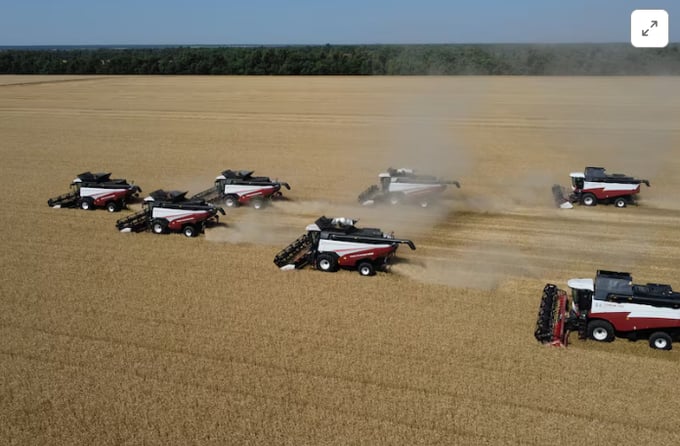May 24, 2025 | 16:26 GMT +7
May 24, 2025 | 16:26 GMT +7
Hotline: 0913.378.918
May 24, 2025 | 16:26 GMT +7
Hotline: 0913.378.918

A drone view shows combines harvesting wheat in a field in the Rostov Region, Russia July 9, 2024.
Accounting for 11% of Russia's total grain harvest last year, Rostov is one of the key regions that Russia's agriculture ministry has said it is monitoring to make further adjustments to an already soft 2024 crop forecast.
The ministry's most recent estimate, made in April and maintained into last week, is for the Russian grain harvest to reach 132 million tonnes in 2024 - down 9% from 145 million in 2023, and 16% from a record 158 million in 2022.
Last week Rostov said it was expecting its grain harvest to decline 38% this year to 10 million tonnes, as a blistering heatwave followed spring frosts.
"The wheat came out of winter in good condition, and the prospects for the harvest were excellent, but now we are harvesting what is left for us," said Sergey Sasunov, chief agronomist of the Rassvet farm in the Rostov region.
Sasunov estimated that his farm has harvested only half the volume of last year.
Russia has become the world's leading wheat exporter under President Vladimir Putin, thanks to massive state support and despite Western sanctions on technology and equipment dating back to Russia's annexation of Crimea in 2014.
Its agricultural boom has transformed many southern regions like Rostov, with cultivated fields now dominating the landscape. It has also improved the regions' living standards.
Global warming has opened up new northern areas in Russia for agriculture, but extreme weather patterns have made harvests volatile in southern regions like Rostov.
Fears of lower Russian output helped global wheat prices rally in April, but they had given up much of those gains by June on hopes of better-than-expected Russian yields and higher U.S. production.
Those hopes might be premature.
Russia's agriculture minister Oksana Lut has singled out drought as the main factor that could force the government to revise its grain harvest forecast this year.
Sasunov said he had seen hardly any rainfall in his area since March. Many farmers in the Rostov region also blame frosts, which killed developing sprouts in early spring, for lower harvests.
At the Kirovsk Horse Farm, temperatures fell to minus 4-5 Celsius in early May. "Indicators were excellent, but then climatic cataclysms began," said the farm's deputy head Nikolai Cherkezov.
"Corn is really suffering at the moment. Sunflower has been reseeded; all spring harvests are really suppressed now," said Cherkezov, referring to damage done by both frost and heat.
A poorer-than-expected crop will fuel Russian inflation, which is already running at 8.6%, amid high state spending and wage growth in an economy showing signs of overheating.
Steppe, one of Russia's largest agricultural companies, which owns lands in Rostov and two other key agricultural regions Stavropol and Krasnodar, said it expects its grain harvest to be 10% lower compared to last year.
Agriculture consultancy Sovecon said that temperatures in key grain-producing regions will stay 2-6 degrees above normal in the coming weeks.
Russia's chief meteorologist Roman Vilfand said that periods of extreme heat across Russia will become longer in the coming years, and floods and hurricanes will become more frequent.
"Agriculture is an open-air workshop. We cannot break records every year," said Cherkezov.
(Reuters)

(VAN) Alt Carbon has raised $12 million in a seed round as it plans to scale its carbon dioxide removal work in the South Asian nation.

(VAN) Attempts to bring down the price of the Japanese staple have had little effect amid a cost-of-living crisis.

(VAN) Fourth most important food crop in peril as Latin America and Caribbean suffer from slow-onset climate disaster.

(VAN) Shifting market dynamics and the noise around new legislation has propelled Trouw Nutrition’s research around early life nutrition in poultry. Today, it continues to be a key area of research.

(VAN) India is concerned about its food security and the livelihoods of its farmers if more US food imports are allowed.

(VAN) FAO's Director-General emphasises the need to work together to transform agrifood systems.

(VAN) Europe is facing its worst outbreak of foot-and-mouth since the start of the century.